|
|
|
Sort Order |
|
|
|
Items / Page
|
|
|
|
|
|
|
| Srl | Item |
| 1 |
ID:
158215
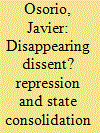

|
|
|
|
|
| Summary/Abstract |
Does violent repression strengthen the state? In this article we explore the legacies of repression by the Mexican government on subsequent patterns of state consolidation. We investigate how a particular form of state repression, forced disappearances of alleged leftist dissidents during the ‘Dirty War’, had path-dependent consequences for different dimensions of state capacity nearly 50 years later. To do so, we rely on data gathered from suppressed Mexican human rights reports of forced disappearances which, to our knowledge, have not been analyzed by social scientists before. Controlling for a rich set of pre-disappearances covariates we find that forced disappearances are positively correlated with contemporary measures of fiscal, territorial, and bureaucratic capacity. However, historical forced disappearances do not help the state to provide security, to consolidate its monopoly over the use of force, or to provide welfare-related public goods in the long run. Moreover, disappearances are negatively correlated with various measures of trust in the government. Forced disappearances committed by the state appear to have long-term yet heterogeneous effects on state consolidation.
|
|
|
|
|
|
|
|
|
|
|
|
|
|
|
|
| 2 |
ID:
158214


|
|
|
|
|
| Summary/Abstract |
This article explores the dynamics of internal resettlement in times of civil war by using a novel dataset of all municipalities of Catalonia during the Spanish Civil War (1936–39), which includes information on the total number of internally displaced from other parts of Spain that sought refuge in Catalan localities during the civil war. The dataset, which also incorporates information on relevant covariates, is built with a combination of primary (i.e. archival) and secondary sources. The results of the multivariate analyses indicate that political identities have a significant impact on resettlement: people tend to relocate to places where they can find others who share their political and/or ethnic identity; we see this reflected in political and ethnic alignments at the municipal level. In addition, the article uncovers a relevant dynamic in the diffusion of violence at the local level: the arrival of internal refugees in a new locality may have the unintended effect of increasing levels of direct violence due to its role in disseminating credible news of atrocities committed by the other side. The implications of this study go beyond the Spanish case and make a contribution to unpacking dynamics of violence and internal displacement in civil wars. The article also sheds light on some of the mechanisms by which refugee flows can play a role in the diffusion of violence throughout a given country.
|
|
|
|
|
|
|
|
|
|
|
|
|
|
|
|
| 3 |
ID:
158212
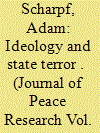

|
|
|
|
|
| Summary/Abstract |
How does ideology influence state terror? Studies on state repression have looked at the leaders’ decisionmaking to explain how much violence states use against internal enemies. However, government leaders usually rely on their security forces to produce violence. I argue that distinct ideological beliefs within the military apparatus produce different levels of repression even if leaders are determined to terrorize the population. I expect officers who share the ideology of their leader to willingly execute the government’s repressive program, while officers who do not share the leader’s convictions refuse to terrorize civilians. I study these dynamics in the case of Argentina’s Dirty War (1975–81) during which the government tasked its ideologically divided army with a nationwide terror campaign. Combining qualitative and quantitative data from historical sources, I identify the ideological beliefs and repressive behavior of military commanders. Consistent with my expectation, I find that loyal nationalist officers in the infantry, artillery, and communications branch of the army perpetrated significantly more violence than liberal cavalry officers who rejected the junta’s terror program. The results demonstrate that ideological beliefs within the state’s security apparatus can lead to violent outcomes that deviate from government orders.
|
|
|
|
|
|
|
|
|
|
|
|
|
|
|
|
| 4 |
ID:
158211
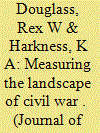

|
|
|
|
|
| Summary/Abstract |
Subnational conflict research increasingly utilizes georeferenced event datasets to understand contentious politics and violence. Yet, how exactly locations are mapped to particular geographies, especially from unstructured text sources such as newspaper reports and archival records, remains opaque and few best practices exist for guiding researchers through the subtle but consequential decisions made during geolocation. We begin to address this gap by developing a systematic approach to georeferencing that articulates the strategies available, empirically diagnoses problems of bias created by both the data generating process and researcher-controlled tasks, and provides new generalizable tools for simultaneously optimizing both the recovery and accuracy of coordinates. We then empirically evaluate our process and tools against new micro-level data on the Mau Mau rebellion (colonial Kenya 1952–60), drawn from 20,000 pages of recently declassified British military intelligence reports. By leveraging a subset of these data that includes map codes alongside natural language location descriptions, we demonstrate how inappropriately georeferencing data can have important downstream consequences in terms of systematically biasing coefficients or altering statistical significance and how our tools can help alleviate these problems.
|
|
|
|
|
|
|
|
|
|
|
|
|
|
|
|
| 5 |
ID:
158207


|
|
|
|
|
| Summary/Abstract |
As they pursue information and deploy violence during conflict, combatants compose, catalog, and preserve a wide variety of records, such as memos, investigative reports, and communiqués. In an increasing number of post-conflict scenarios, these records are being archived and released publicly, quickly becoming a critical new source of data for studies of peace and conflict. The objective of this special issue is to advance a new research agenda focused on the systematic analysis of conflict archives. The contributors each spent significant time collecting original data from often-dusty archives and, in many cases, developed new methodologies for sampling, cataloging, and analyzing historical documents. Their findings reveal how violence simultaneously shapes and is shaped by factors that remain largely unobservable using more conventional sources of conflict data, including clandestine mobilization, bureaucratic accountability, and political identities. By considering these studies in relation to one another, this introduction aims to provide readers with a comprehensive understanding of field research strategies and analytical techniques for studying original data from conflict archives. We conclude that while archival data are subject to their own biases that must be considered, this research agenda addresses significant limitations associated with traditional data sources and, in turn, pushes scholars to rethink many of the mechanisms underlying the causes and dynamics of peace and conflict.
|
|
|
|
|
|
|
|
|
|
|
|
|
|
|
|
| 6 |
ID:
158208
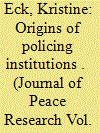

|
|
|
|
|
| Summary/Abstract |
This article examines the impact of colonial-era armed conflict on contemporary institutions. It argues that when British colonial administrators were faced with armed insurrection they responded with institutional reform of the police, and that the legacy of these reforms lives on today. Violent opposition prompted the British colonial administration to expand entrance opportunities for local inhabitants in order to collect intelligence needed to prosecute a counterinsurgency campaign. This investment in human capital and institutional reform remained when the colonial power departed; as a result, countries which experienced colonial-era conflict have more efficient policing structures today. I demonstrate how this worked in practice during the Malayan Emergency, 1948–60. Archival data from Malaysia show that local inhabitants were recruited into the police force in greater numbers and were provided with training which they would not have received had there been no insurgency. This process was consolidated and reproduced upon independence in path-dependent ways. To expand the empirical domain, I statistically explore new archival data collected from the UK National Archives on police financing across colonial territories. The results show that armed insurgency during the colonial era is associated with higher percentages of police expenditure during the colonial era and higher perceived levels of contemporary policing capacity.
|
|
|
|
|
|
|
|
|
|
|
|
|
|
|
|
| 7 |
ID:
158210
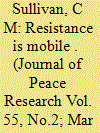

|
|
|
|
|
| Summary/Abstract |
An emerging consensus holds that achieving successful counter-movement outcomes requires combining overt repression (e.g. raids, arrests, and targeted assassination) with covert repression (e.g. monitoring, agents provocateurs, and wiretapping). Research in this article disputes the presumed complementarity between overt and covert repressive tactics. When overt repression signals new information about the state’s covert intelligence collection program, challengers respond in ways that frustrate efforts to accumulate new intelligence. These propositions are investigated using original, weekly panel data on a black nationalist insurgent organization, the Republic of New Africa (RNA), and US Red Squad counter-movement activities directed against this group (between 1968 and 1971). Using archived materials generated by various policing agencies and their rivals in the RNA, the analyses provide new understanding of dynamics rarely observed or analyzed systematically. Findings reveal that the two methods of political repression can work at cross purposes. Overt repression motivates challenger adaption towards less readily observable tactics and organizational forms; covert repression subsequently fails to identify challengers’ actions or identities. These findings hold even while controlling for challenger mobilization and government investment in covert repression. In addition to advancing our understanding of what happens to behavioral challengers when governments repress, the results help to shed light on some of the factors that make defeating domestic challengers so difficult. Each ‘step forward’ taken by counter-movement forces potentially makes the next one more difficult.
|
|
|
|
|
|
|
|
|
|
|
|
|
|
|
|
| 8 |
ID:
158216
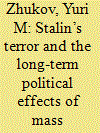

|
|
|
|
|
| Summary/Abstract |
Repression has a long-term negative effect on political participation. Using millions of arrest records from archival documents, and polling station-level election results, we examine how exposure to Stalin-era repression affects voter turnout in Putin’s Russia. To estimate the effect of repression on voting, we exploit exogenous variation in repression due to the structure of mid-century Soviet railroads, and travel distances to prison camps. We find that communities more heavily repressed under Stalin are less likely to vote today. The electoral legacy of Stalin’s terror – decades after the Soviet collapse, and across multiple election cycles (2003–12) – is systematically lower turnout. To show that our result is not unique to the Putin regime, we replicate our analysis in Ukraine (2004–14), and find similar patterns. These results highlight the negative consequences of repression for political behavior, and challenge the emerging view that exposure to violence increases political engagement. While past research has emphasized the short-term effects of repression over several months or years, we show that these effects may be durable over generations and even changes of political regime. Our findings also demonstrate that repression need not be collective or indiscriminate to have community-level effects.
|
|
|
|
|
|
|
|
|
|
|
|
|
|
|
|
| 9 |
ID:
158209
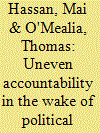

|
|
|
|
|
| Summary/Abstract |
The government faces a principal–agent problem with lower-level state officers. Officers are often expected to use the state coercive capacity endowed to them to politically benefit the government. But officers can shirk from the government’s demands. An officer’s actions during bouts of large-scale and highly visible electoral violence reveal the officer’s type, thereby providing the government with the information necessary to solve its principal–agent problem for the future. The government holds officers who used their authority to perpetuate incumbent-instigated violence accountable through positive rewards, while holding officers who used their authority to perpetuate opposition-instigated violence accountable through negative sanctions. We find evidence in support of the theory using micro-level archival data on 2,500 local officer appointments and fine-grained satellite data on the locations of violence in the aftermath of Kenya’s 2007 election. The Kenyan government was more likely to fire officials whose jurisdictions saw opposition-instigated violence that targeted government supporters. But we find the opposite result where violence was instigated by incumbent supporters: there, officers were less likely to be fired if violence occurred in their jurisdiction. Our results indicate that leaders can manipulate accountability processes after political violence to further politicize the state.
|
|
|
|
|
|
|
|
|
|
|
|
|
|
|
|
| 10 |
ID:
158213
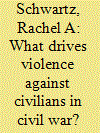

|
|
|
|
|
| Summary/Abstract |
Dominant theories of mass violence hold that strategic concerns in civil war drive the deliberate targeting of civilians. However, the causal mechanisms that link strategic objectives to large-scale violence against civilians remain underspecified, and as such the causal logics that underpin each remain blurred. In this article, we identify and explicate four plausible mechanisms that explain why armed groups would target, for strategic purposes, civilians in war. We then turn to the peak period of violence during the Guatemalan armed conflict to assess which mechanisms were most prevalent. Specifically, we leverage unique archival data: 359 pages of military files from Operation Sofía, a month-long counterinsurgent campaign waged in the northwestern Ixil region. Through process tracing of real-time internal communications, we find that state actors most commonly described the civilian population as loyal to rebel forces; violence against civilians was a means to weaken the insurgency. Troops on the ground also depicted the Ixil population as ‘winnable’, which suggests that security forces used violence in this period to shape civilian behavior. These findings are most consistent with the idea that mass violence in this case and period was a coercive instrument to defeat insurgents by punishing civilians for collaboration. The evidence from this period is less consistent with a logic of genocide, in which the purpose of violence would be to destroy ‘unwinnable’ civilian groups. Our analysis illustrates how a mechanism-centered approach based on process tracing of conflict archives can help uncover logics underlying civilian killing.
|
|
|
|
|
|
|
|
|
|
|
|
|
|
|
|
|
|
|
|
|